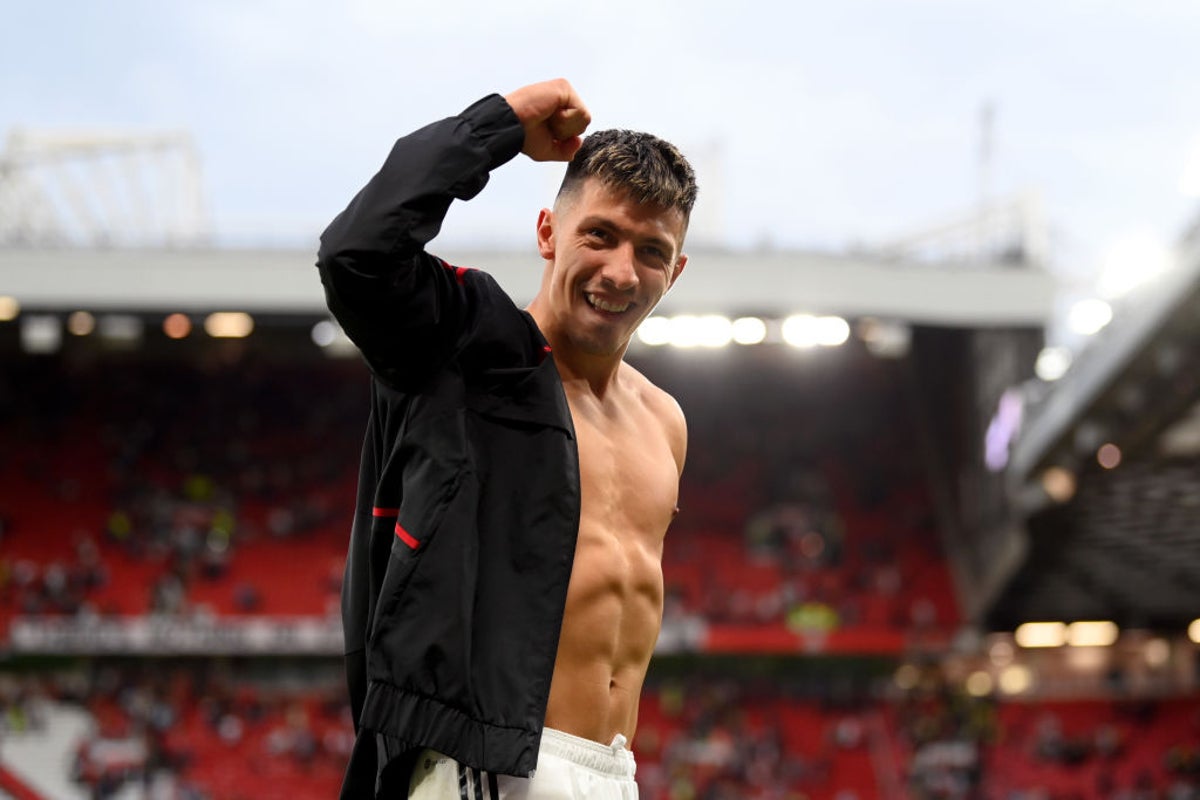
The warrior centre-back saved the surprise for the end. Lisandro Martinez’s conversation had been sprinkled with the word “fight” and it scarcely felt surprising, There are sleek, elegant defenders who steal in unnoticed, as though they can complete the game without a speck of dirt on them, and there are stolid, solid ones, primed to head anything away but sometimes essentially uninteresting. And then there are those such as Martinez, a charismatic scrapper whose brand of full-blooded commitment has made him a Manchester United cult hero.
But not, it transpired, a serial miscreant. His Albiceleste team-mate Cristian Romero may conform more to the image of the Argentinian centre-back, leaping recklessly where others fear to tread, almost accepting red cards as an occupational hazard. Martinez can seem no less combative, but he has managed to ally a willingness to tackle with an awareness of what he can and cannot get away with.
He has a solitary sending off in his career; as many as the more placid Marcus Rashford. “Two yellow cards. Two mistakes,” said Martinez. He may have mastered the art of combining aggression and control. “It is really hard,” he smiled. “Sometimes I want to kill but you have to control as well. I can do it otherwise I will be suspended every game. You have to be clever.”
He needs cunning for other reasons. He starts with an impediment for a player in his position. He has touched heights, winning the World Cup, but from a low base. Famously, he is 5ft 9ins. The Premier League’s shortest centre-back this season has shaped up as one of its best, albeit after a false start.

He was doubted in England; but not just in England. “In the beginning in Argentina, it was the same,” he added. “But it’s normal because, in football, it’s not normal to play as a centre-back with my height. It’s not easy as well. I try to do my best but you have to work very hard. You have to be very clever on the pitch, because you have to be sharp in every situation, because if you’re smart you can win the duels.”
The doubts were more pronounced after his first two games for United; the 2-1 defeat to Brighton and the 4-0 loss at Brentford, when Erik ten Hag hauled off an Ajax ally at half-time and after all four goals had already gone in.
United’s £56 million outlay seemed misguided, Ten Hag’s judgment flawed. Yet times like that call for a fighter. “It was tough, for sure, because it was not the start that we wanted,” Martinez reflected. “It was hard, the result, the way that we lose, the attitude was really bad. We changed directly the mentality. It was like, okay, we are in the ground but now we have to prove, to fight again. Sometimes it is good to see the bad things and then you have to change on the pitch. We looked at the badge. We say, ‘guys, this is not possible, we have to change this’.”
Martinez has proved a leader in the new era, keeping the captain Harry Maguire out of the team, forging a fine partnership with Raphael Varane, endearing himself to the United fans who, as they did for Gabriel Heinze and Carlos Tevez, chorus “Argentina” in his honour. Martinez had the chance to join Arsenal in the summer and choosing United could cost him a Premier League winner’s medal. But he could get his hands on the first silverware of the season in the Carabao Cup on Sunday. Ten Hag’s style of management should equip United well. “He prepares for every game like it’s a final,” Martinez explained. “I had been with Erik for three years at Ajax, I know him very well and everybody knows how big Manchester United is around the world so that was the key as well, to come here to Manchester United.”

Those three years at Ajax meant Martinez is accustomed to silverware. He has added the Copa America and the World Cup with his country. Now he has a typical way to try and end United’s six-year wait. “If you want to win trophies you have to do the right things,” he said. “And if you have to fight or you have to be strict with someone, you have to do it.”
Fighting, he believes, is in the blood, in the air in his homeland. “I think it’s our culture from Argentina, Argentinian players are always like this, we are passionate,” he said. “Football for us is like everything so that is why we always give everything of us. As a kid, I remember when I was really young, like four or five-years-old, I start to fight and I start to cry when I lose, so it is something we have in the blood, we have in the heart, it’s our culture.”
And as the World Cup showed, it can be a winning culture.







